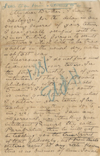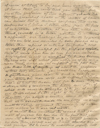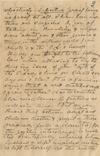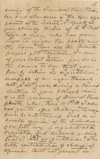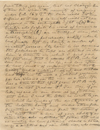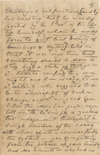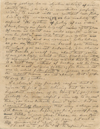Mahatma Letter to Hume - LMW 1 No. 43
| Quick Facts | |
|---|---|
| People involved | |
| Written by: | Koot Hoomi |
| Received by: | A. O. Hume |
| Sent via: | unknown |
| Dates | |
| Written on: | unknown |
| Received on: | 1881 or 1882 |
| Other dates: | unknown |
| Places | |
| Sent from: | unknown |
| Received at: | unknown |
| Via: | unknown |
This letter is Letter No. 43 in Letters from the Masters of the Wisdom, First Series. Mahatma Koot Hoomi rebukes Allan Octavian Hume for setting aside his relationship with the Mahatmas to study with a "good old Swami."[1] In all editions before the First Series was resequenced in 1988, this was called Letter 30.
< Prev letter in LMW 1
Next letter in LMW 1 >
Page 1 transcription, image, and notes
|
Notation in blue pencil: Letter to be then returned to me. written backward in blue pencil across page: 1881 Text of letter: Му dear Brother, I have to apologize for the delay in answering several of your letters. I was greatly occupied with business entirely foreign to occult matters, and which had to be transacted in the usual dry, matter-of-fact way. Moreover, I do not find much to answer in your letters. In the first you notify me of your intention of studying Advaita philosophy with a ‘good old Swami’. The man, no doubt, is very good; but from what I gather in your letter, if he teaches you anything you say to me, i.e., anything save an impersonal, nоn-thinking and non-intelligent Principle they call Parabrahm, then he will not be teaching you the true spirit of that philosophy, not from its esoteric aspect, at any rate. However, this is no business of mine. You are, |
NOTES: |
Page 2
|
of course, at liberty to try and learn something, since it seems that we could teach you nothing. Only since two professors of two different schools — like the two proverbial cooks in the matter of sauce — can succeed but in making confusion still worse confounded, I believe I better retire from the field of competition altogether; at any rate, until you think yourself in a better Position to understand and appreciate our teachings as you express it. We are held and described by some persons as no better than refined or ‘cultured tantrikas’? Well, we ought to feel grateful for the prefixed adjective since it would have been as easy for our would-be biographers to call us unrefined tantrikas. More-over, the easy way with which you notify us of the comparison made, makes me feel confident of the fact that you know little, if anything, about the Professors of that sect; otherwise, you would have hardly, as a gentleman, given room to such a simile in your letter. One more word will suffice. The ‘tantrikas’ — at least the modern sect, for over 400 years — observe rites and ceremonies, the fitting description of which will never be attempted by the pen of one of our Brotherhood. In the sight of the Europeans, ‘character’ for adepts and ascetics seems as indispensable as to servant-maids. We are sorry we are unable to satisfy, at present, the curiosity of our well-wishers as to our real worth. I cannot leave unnoticed the remark that your want of progress has been due to the fact that you were not allowed to come to us and be taught personally. No more than yourself was Mr Sinnett accorded any such privilege. Yet he seems to understand perfectly well |
NOTES: |
Page 3
|
whatever he is taught, and even the few hazy points upon subjects of an extremely abstruse nature will be very soon cleared for him. Nor have we ever had ‘one word of unpleasantness’ between us — not even between him and M whose bluntness in speaking out his mind is often very great. And, since you bring out again the question of our supposed identity with the ‘O. L.’ the question in days of yore, I will, with your per¬mission, have a few words to say to this. Even now, you confess that you are not sure, that you cannot tell whether I am not Djual-Khool or a ‘Spirit of the high Eastern plane’ (the latter being an honour, indeed, after being suspected as a tantrika)', ergo, you think, I ‘cannot honestly wonder’ at your doubts. No; I wonder at nothing, for I knew all this long ago. Some day this and much more will be demonstrated by you |
NOTES:
|
Page 4
|
objectively — subjective proof being no proof at all. I have been more than once suspected by you of taking my knowledge and impressions about you and other persons and things in the outside world from Olcott’s and the ‘O. L.'s' heads. Kindly give thought to the following law, when alluding to my taking my ideas of you ‘out of the Old Lady’s head or Olcott’s, or any one else’s’. It is а familiar saying that a well matched couple ‘grow together’, so as to come to a close resemblance in features as well as in mind. But do you know that between adept and chela — master and pupil — there gradually forms a closer tie; for the psychic interchange is regulated scientifically, whereas between husband and wife unaided nature is left to herself. As the water |
NOTES: |
Page 5
|
in a full tank runs into an empty one which it is connected with; and as the common level will be sooner or later reached according to the capacity of the feedpipe, so does the knowledge of the adept flow to the chela; and the chela attains the adept level according to his receptive capacities. At the same time the chela being an individual, a separate evolution, unconsciously imparts to the master the quality of his accumulated mentality. The master absorbs his knowledge; and if it is a question of language he does not know, the master will get the chela’s linguistic accumulations just as they are — idioms and all — unless he takes the trouble to sift and remodel the phrases when using. Proof M. who does not know English and has to use Olcott’s or the O. L.’s language. So you see it is quite possible for me to catch H.P.B.’s or any other chela’s ideas about you without meaning to do you any injustice; for whenever we find such ideas — unless trifling — we never proceed to judge and render our sentences merely on the testimony of such borrowed light; but always ascertain independently and for ourselves whether the ideas so reflected in us are right or wrong. And now a few words about your letter of the 5th ultimo. However great the Services — in connection with literary worth — rendered us by Mr A. O. Hume, the President of the Eclectic has nevertheless done nothing whatever for his Branch. You have dropped it out of your thoughts — to all intents and purposes, my dear Brother, from the first. All your energies were |
IMAGE NOT |
NOTES: |
Page 6
|
devoted to the comprehension of our philosophy, and the knowledge and acquirements of our secret doctrines. You have done a good deal in this direction and I thank you heartily. Yet no attempt was ever made to organize your Branch on a firm foundation, not even regular meetings held; on the plea that you were not allowed to know all, you gave your fellows nothing. And since you say you appreciate sincerity, then I will say more. Many of the Fellows of the Calcutta Branch who complained that out of the only two Englishmen — men of real education and learning — who took an active part in the work of the Society, the President of the Eclectic while leaving many a letter unanswered from Fellows loyal and devoted to the Cause, and paying little if any attention to his own Branch, was known to hold a most friendly correspondence with one who was publicly and widely known as the greatest |
NOTES: |
Page 7
|
enemy of the Founders, their traducer and slanderer and the open Opponent of the Society. I speak, as you already know, of S. K. Chatterjee, a man who has done more to injure the Society and the cause than all the Calcutta papers put together. In one of your latest letters you do me the honour to say that you firmly believe me a ‘gentleman’, incapable of an ungentlemanly act. Last year, during a Council meeting in your billiard-room, and in the presence of several theosophists, when, thro’ H.P.B. I advied you to offer Chatterjee to resign since he entertained such a miserable opinion of the Founders — you felt very indignant at the Suggestion and declared publicly that I was ‘no gentleman’. This little contradiction and change of opinion must not prevent me |
NOTES: |
Page 8
|
from telling you again, that had Chatterjee then and there been shown the necessity of resigning under rule 16 and 17th, the Cause would not have suffered as it has, and he himself would not have appeared in the contemptible light of (а) a traitor who forfeits his word of honour as a theosophist; (b) an untruthful man, deliberately telling falsehoods; and (c) when he had finally left the Society, a reviler of innocent persons. The harm he has done, and the falsehoods he told are detailed in Mohini’s letter to me which I send you. The fact alone that he accused who had seen him but once in her life, and long after he had joined, of confessing to him that the Society had a political object, and that she had asked him to make a political Programme for her, shows you the man as a liar. If he has a letter to that effect from H.P.B. why does he not produce it? You may, if you like, regard me once more as по gentleman, but when I read the letter he wrote to you in which he speaks of the disintegration of the Calcutta Society and makes other false suggestions, I wondered from the bottom of my heart that a man of your ability and discrimination, who undertakes to fathom that which no uninitiate has ever fathomed, should be so taken in by an ambitious and vain little man, who succeeded |
NOTES: |
Page 9
|
in striking the right chord in your heart and plays upon it ever since! Yes; he was once upon a time an honest, sincere man; he has some good qualities in him, that may be called redeeming qualities; with all that, he has shown that to achieve an object and gain advantage over those he hates more than the Founders if possible he could also lie and resort to dishonourable actions. But enough of him — who is mentioned here simply in connection with your resignation as President of the Eclectic. For, when the Chohan and M. after calling repeatedly my attention to the fact that great harm was done to the Cause by |
NOTES: |
Page 10
|
Chatterjee’s vilifications (and by his boasting that he was supported by the Pres. of the Eclectic himself whom he would force to quit that Society of humbugs and myths), told me that it was high time that something should be done to stop such a state of things, I had but to confess that they were right and I — wrong. It was I, certainly, who suggested to Mr S. the advisability of such а change; and I am glad you liked the idea. You prefer, as you teil me, to be ‘simply a zealous tho’ independent theosophist, a simple member of the Society with whose objects — however faulty the System... you sympathize from the bottom of your heart’, and Mr Sinnett — who had no |
NOTES: |
Page 11
|
more and perhaps less, objective certainty of our identity than you had — is nevertheless perfectly willing to work with us without ever feeling his loyalty wavering or his inability to defend ‘the System and policy of our order’. Thus, every one feels himself in his right place. Of course no honest man could associate with us once he felt a ‘conviction’ that our System was ‘quite wrong’; and one, moreover, who believes, as you do, that since we broach some theories to which you cannot subscribe you should not trouble yourself even about that portion of our philosophy which is true. Had I any intention of arguing, I might perhaps remark that the latter is a most easy method of burking all the Sciences as well as all religious Systems; for there is not one in which false facts and unproven and even the wildest theories do not abound. But I prefer to drop the question. To close, I may frankly confess that I rejoice to find you believing that ‘as an independent member of the Society I (you) shall probably be more useful and more able to do good’ than you have hitherto been. I rejoice, but — I cannot help knowing that many a change will yet occur in you before you find yourself finally settled in your ideas. Pardon me, dear Brother; I would not give you pain, but such is mу opinion — and I abide by it. You ask me to get the ‘O. L.’ to refrain from |
NOTES: |
Page 12
|
proposing you for the Council. I do not believe there is the slightest danger of her doing it. 1 know, in fact, that she is the last person in the world to propose you now. Rightly or wrongly she feels herself injured by you to the very root of her heart; and, I am bound to confess, that — no doubt unwillingly — yet you have hurt her feelings very deeply upon several occasions. Nevertheless, permit me to sign myself your obedient servant. Whenever you need me, and when you have done your study with the ‘Swami’ — then I will be again at your Service. Yours faithfully,
|
NOTES: |
Context and background
In his first edition, Mr. Jinarajadasa provided these notes:
This is evidently one of the letters to Mr. A. O. Hume, written in 1881 or 1882. Reprinted from The Theosophist, June 1907, pp. 702-6.[2]
In later editions, these notes were included:
Transcribed from the original at Adyar. It bears written across, in blue pencil, in HPB's hand, 'Letter to Mr Hume returned to me.' Its date is probably 1882, 'M [symbol] whose bluntness' refers to the letters written by the Master M. To Mr Sinnett and Mr Hume. These letters of the Master, not yet published, reveal a personality whose style is direct and incisive, and most refrsshing in its candour.
The above was my note written in the first edition of 1919. Soon after 1895, when a friendship began between Dr Annie Besant and Mr A. P. Sinnett, he allowed her to copy what she liked from the letters which he had received from the Masters. The work was given to Miss Edith Ward, and some letters, but not all, were copied. These copies have been at Adyar since 1907, when Dr Besant settled here as President of the TS. On several occasions she read from them with comments at meetings at Adyar of the Esoteric School. Since then, several letters of the Master M. were published by me in 1925 in the Second Series of the Letters, and two years earlier in 1923 all that Mr Sinnett had received were published by Mr A. Trevor Barker in The Mahatma Letters to A. P, Sinnett.
'M [symbol] who does not know English'": this was in 1882. So unessential evidently are words and phrases, compared to the thought of the thinker, that I have been able to find very few traces, in the letters of the Master M., of the personal idiosyncrasies of though of either HPB or HSO. A giant may use a child's toy hammer, but the power behind the blow is that of a giant's arm and not that of a child. HPB writes that the letters from the Master M. were englished for him by the Master DK, natually after the mould of thought of the original thinker.[3]
Physical description of letter
The original letter is at the Adyar headquarters of the Theosophical Society. The location of the fifth page is not known.
Publication history
This was published in The Theosophist Vol 28 (June, 1907, pp. 702-6) from a copy written out by Miss Edith Ward from the original letter loaned to Annie Besant by A. P. Sinnett.
In 1919 it was presented as Letter 30 in the first edition of Letters from the Masters of the Wisdom, 1881-1888, later known as the First Series.[4] That designation continued through all editions until the First Series was resequenced in 1988.
Commentary about this letter
Additional resources
Notes
- ↑ C. Jinarajadasa, Letters from the Masters of the Wisdom, First Series (Adyar, Chennai, India: Theosophical Publishing House, 2011), 90-99, 162-163.
- ↑ C. Jinarajadasa, Letters from the Masters of the Wisdom, 1881-1888 (Adyar, Madras, India; London: Theosophical Publishing House, 1919), 120.
- ↑ C. Jinarajadasa, Letters from the Masters of the Wisdom, First Series (Adyar, Chennai, India: Theosophical Publishing House, 2011), 162-163.
- ↑ Letters from the Masters of the Wisdom, 1881-1888. Adyar, Madras, India; London: Theosophical Publishing House, 1919. Foreword by Annie Besant; transcribed and compiled by C. Jinarajadasa.
